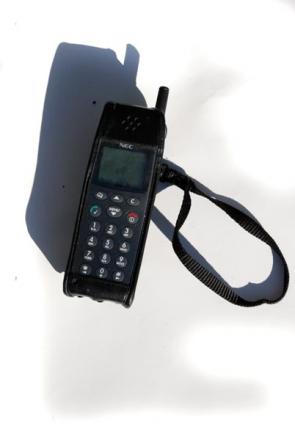Tantalum
Tantalum highlights the importance of ``old'' economy precious metals have in the make-up of ``new'' economy products. It’s a critical component in small mobile phones, as well as the old G9 brick-like phone on sale here made in UK by NEC, and also in portable computers, game consoles such as the Sony Playstation and other electronic devices such as GPS devices and in electronic components in cars.
TANTALUM is a powder compacted for use in producing ultra-small passive capacitors that regulate voltage at high temperatures. Demand for this tiny but sophisticated component from the likes of mobile phone giants Nokia and Motorola pushed the price of the precious metal around 600 percent higher in 1980 and 2000-1 as an upsurge in sales meant demand far outstripped projected supply. The herd mentality kicked in, and prices rose.
Tantalum ores are mined in Ethiopia, Australia, Brazil, Egypt, Canada, the Democratic Republic of the Congo, Mozambique, Nigeria, Namibia, Portugal, Malaysia and Thailand.
‘Tantalite is largely found mixed with columbite in an ore called coltan. Ethical questions have been raised about human rights and endangered wildlife, due to the exploitation of resources in the conflict regions of the
Congo.
With a land area as vast as that of Texas, California, Montana, New Mexico, Arizona, Nevada and Colorado combined, the DRC has only 300 miles of paved roads. To reach one of the many cassiterite mines in the virtually roadless northeast, 1,000 miles from the national capital Kinshasa, Miller's team followed a 40-mile footpath that, he reported, was as "busy as a motorway. Four thousand porters ply this route carrying sacks of rock heavier than they are. Each of their 50 kilogram packs of cassiterite is worth US$400 on the world market. Government soldiers often force porters at gunpoint to carry the rocks free of charge; if they're lucky, though, they can make up to $5 a day."
So, why should we care? Because without cassiterite rock and the other ores mined in the Congo we would be unable to manufacture the linchpins of our global "weightless economy" -- computers and telephones.’
- By Charles Bethea. Test Wired. Posted November 2006.
With a long supply chain the details from suppliers becomes sketchy. Business would be doing something illegal if it weren’t maximising profits for shareholders by using the cheapest materials available.
But despite the rather convoluted trail of coltan, most of it wound up bought by just three companies - Cabot Inc. of the United States, Germany's HC Starc and China's Nigncxia – which at the time were the only firms with processing plants to turn coltan into the coveted tantalum powder.
In the UK, Sheffield is where sorting and analysis takes places of recycled Tantalum.
African continent renamed after Bono.
'Sometimes, when I'm walking down the street, a passer by will say, "love your work on Africa Bono, great cause…"'
This is the opening sentence of Bono's blog on the ‘One’ website. One is the American sister to Make Poverty History, and Bono is its principal figurehead. Here, he's writing to promote Product RED which is essentially a way of getting corporations to listen to us (his words not mine) by consuming red things rather than things painted other colours. Of course many of the problems are due to over-consumption.
Of course, companies such as Motorola, keen to distance themselves from the problems associated with the veracity of these claims are quitre willing to come on board the RED campaign of which Bono is a spokesperson and disfigurehead. I don’t think I need to waste time here discussing the fact that he’s spent years looking into Africa’s problems, and that he must have been keenly aware of a war some commentators have called Africa’s First World War, involving six states and killing tens of millions of people over a 12 year period with troops from Libya in the north to Zimbabwe in the south.
Whilst searching for information about the current state of corporate citizenship on the issue of ‘blood mobiles’ on NEC-Tokin’s website, I could only find some information about their blood donor projects at the company. In a bid to find out more, I emailed the NEC-TOKIN corporation, who quickly replied to my enquiries with this statement: ”Because we are informed that tantalum mined in Africa (especially Congo) sacrifices wildlives (sic) during its production, we purchace (sic) tantalum from suppliers with a certificate which states that no tantalum mined in Congo is used." This seems to be an official line that most of the large corporations use, though the ‘certificate’ isn’t backed up by any international law and is rather greyer, as so and so states….
A British diplomat ‘lost’ two satellite phones in Iraq in 2006, and Foreign Office officials had to admit to MP’s that the stolen phones had “nothing to do with terrorism but more to do with a budding entrepreneur and a telephone porn network.”
FO officials had already admitted that the lost phones had cost them £594,000 in unauthorised phone bills but it is now bracing itself for an extremely critical report from the Commons public accounts committee on how it came to pay phone bills, which at one stage hit £212,000 in one month, without asking questions.” (Guardian March 2006)
Nokia, a Scandinavian company well rated in both the Dow Jones sustainability indexes and listed in FTSE4Good, for instance stated in 2001 that "We are doing our outmost to avoid using tantalum from Congo in our products. Nokia has sent a notification of the Congo situation to its suppliers using Tantalum asking them to follow the situation, and to avoid purchasing tantalum from Congo."
